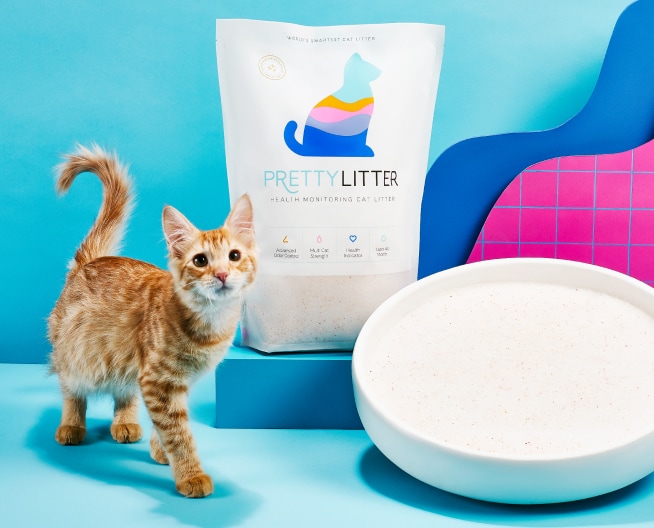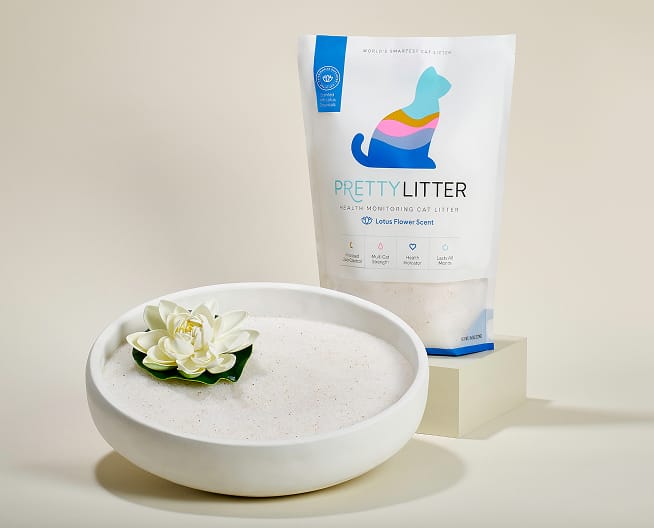January 15, 2020 |9 min read |Veterinarian Reviewed
What Scents Are Safe For Cats?

Written by

Updated Dec 1, 2025
Smelly cat... smelly cat... what are they feeding you? Sometimes our adorable kitties have an unpleasant litter box smell. But before you use essential oils, be sure you know what kind of pet-safe essential oils there are for cats, so you and your fur baby can enjoy a long, healthy life together.
You may not realize it, but certain scents and pure essential oils like tea tree, citrus, and eucalyptus oil can be toxic oils to your little feline. Many compounds in these pure essential oils contain toxins that can be fatal if your pet breathes them in or ingests them–poisoning is rare but serious–an adverse reaction on our furry friend's health would be the last thing a pet parent would want. What’s safe for a dog is not automatically safe for a cat, and any medication your pet takes can change risk levels, too.
Here are a few things you should know about essential oils that can be used to minimize litter box smell, including a list of harmful household scents and toxic oils you need to watch out for. To help you keep your home smelling not like a litter box, we've also put together a list of non-toxic oil alternatives you can use in your essential oil diffuser to keep your little feline safe while you freshen up your home. Using essential oils to calm an anxious cat? Learn more about how to calm down a cat with anxiety.
Safe vs. Toxic Scents for Cats
As a pet parent, you simply want the best for your fur baby. It’s not always easy trying to navigate what’s okay to have in the home (such as knowing the types of plants good for cats) or what you should get rid of.
Safer Scent Sources (use extremely diluted, with vet approval)
According to the ASPCA, the following plants are feline-friendly:
- Basil
- Easter Lily Cactus
- Fennel
- Hibiscus
- Jasmine
- Lemon Balm
- Rose
- Sage
- Thyme
Toxic Essential Oils to Avoid Around Cats
Certain essential oils can cause "gastrointestinal upset, central nervous system depression, and even liver damage could occur if ingested in significant quantities,” according to the ASPCA.
The following essential oils contain phenols that could harm your little furball:
- Citrus oil
- Tea tree oil
- Wintergreen oil
- Pine oil
- Peppermint oil
- Eucalyptus oil
- Ylang Ylang oil
- Pennyroyal oil
- Sweet birch oil
- Clove oil
- Lavender oil
Remember to take precautions if you use any of these oils so your kitty cat doesn’t accidentally contact, ingest, or inhale them. Ingestion or prolonged exposure to essential oils, such as eucalyptus, is not safe for cats and can lead to adverse health effects. If you enjoy using these essential oils, consider only diffusing them outside of the home, such as at the office, or keep them in a room that your kitty isn't allowed to venture into.
If you use them on your skin, be sure to wash your hands extremely thoroughly before cuddling your precious kitty.

Are Essential Oils Harmful to Cats?
There’s nothing quite so purr-fect as coming home to a cuddly little fur baby on the couch in a nicely scented home. But as pleasant as it may be to enjoy essential oils, potpourri, and aromatherapy, some of the compounds in these fragrances can be harmful to your little feline.
It used to be common to treat certain kitty ailments like respiratory problems and ear mite infestations with essential oils. However, over time, studies have shown compelling evidence that many essential oils are toxic to cats, whether inhaled, taken orally, or applied to their skin, even when diluted.
In fact, exposure to some essential oils can cause liver failure, respiratory problems, or even fatality in the worst cases. If your pet is on any medication, ask your vet before you use essential oils; interactions can increase the risk of poisoning.
Why Do “Safe for Humans” Oils Harm Cats?
The answer: phenols.
Phenols are compounds that are naturally found in certain plants and are heavily concentrated in essential oils. Our little furry friends lack the specific enzymes needed to efficiently metabolize phenols and other compounds in essential oils.
Safe-Use Tips for Diffusers and Oils
- Diluted only: Use extremely diluted blends; avoid direct skin or fur application.
- Ventilation: Run diffusers in well-ventilated areas and limit session length.
- Exit option: Always allow your cat to leave the room.
- No residue: Keep droplets off counters, fabrics, and your hands before petting.
- Room control: Keep off-limits rooms for any stronger fragrances.
What Are the Signs of Toxic Scent Exposure?
Cats, especially fuzzy-wuzzy ones, can absorb different oils simply by rubbing their fur up against surfaces coated with the oil - whether that's your hands, the side of your essential oil diffuser, or even a counter with a stray droplet.
However, cats can also absorb them by inhaling oil droplets that have been diffused and are floating around in the air. Diffused oils can also land on your little friend's fur, which could be ingested while she bathes and cleans herself.
Phenol toxicity can happen over long periods of time or quickly, depending on the level of exposure. This can cause respiratory irritation, and the liver is often the organ that is most affected by harmful essential oils since it is where the body tries to process the compounds.
As you can see, essential oil positioning can be a serious threat to your animal. As pet parents, it is your duty to research which essential oils are not safe for cats so you can avoid any kind of toxicity for your four-legged friend. (Again, what’s fine for a dog may be toxic for a cat.)
Some common signs your kitty may have been exposed to harmful scents include:
- Watery nose
- Watery eyes
- Drooling
- Vomiting
- Tremors
- Low Heart Rate
- Low blood pressure
- Ataxia (wobbliness)
- Difficulty Breathing
- Liver failure
If you use essential oils and you notice any of these symptoms in your kitty, take her to the veterinary hospital immediately to treat them for essential oil poisoning.
You can also call the ASPCA Animal Poison Control Center (APCC) at (888) 426-4435 for advice in emergency situations. This pet poison helpline is open 24 hours a day, 365 days a year, bless their feline-loving hearts.

What Essential Oil Scents Are Safe for Cats, Fur Real?
Don't worry, you don't need to give up on your favorite diffuser or oil-infused potpourri just yet. Not all scents are harmful to kitties or will cause any kind of essential oil toxicity. There's still a way you and your little feline can enjoy a meow-nificent, aromatic home.
If you're wondering what essential oil scents are safe for cats, you should first understand which plants are non-toxic to cats, since essential oils are derived from our green friends.
However, just because these plants are safe for kitties, it doesn't mean that the essential oils derived from them are always safe. We just need to be mindful of essential oil safety. Plants in their natural, whole form have relatively low concentrations of phenols and other compounds that can cause toxicity effects.
In essential oils, however, you'll find much higher percentages of potentially harmful toxins. Additionally, different essential oil manufacturers include different concentrations of the various components of the plants' oils.
At the end of the day, it’s always best to research each individual oil you plan to use before diffusing it in an area where your kitty will wander or wearing them on your skin. Consider what method you'll be using to diffuse your pure essential oil, such as liquid potpourri, passive diffusers, or a reed diffuser. As a pet owner, it's important to be aware of how invasive your aromatherapy is on a cat's health, and to only use extremely diluted blends if, and only if, your vet approves.
For specific questions about your kitty's safety, call your local veterinarian or meet with your vet in person for more information about what scents are safe for cats so you and your little fur baby can enjoy a paw-sitive, healthy home life.
Of course, one of the best ways to reduce harmful scents in your home is to eliminate the need by stopping odors before they start. Health monitoring crystals in litter can help trap odor while allowing moisture to evaporate. "Smelly cat" just became "happy cat!"
Have a personal story to share about your fur baby's experience with essential oils? Leave a comment below about your experience with different scents in the home. You may end up helping other cat parents by sharing your experience.









